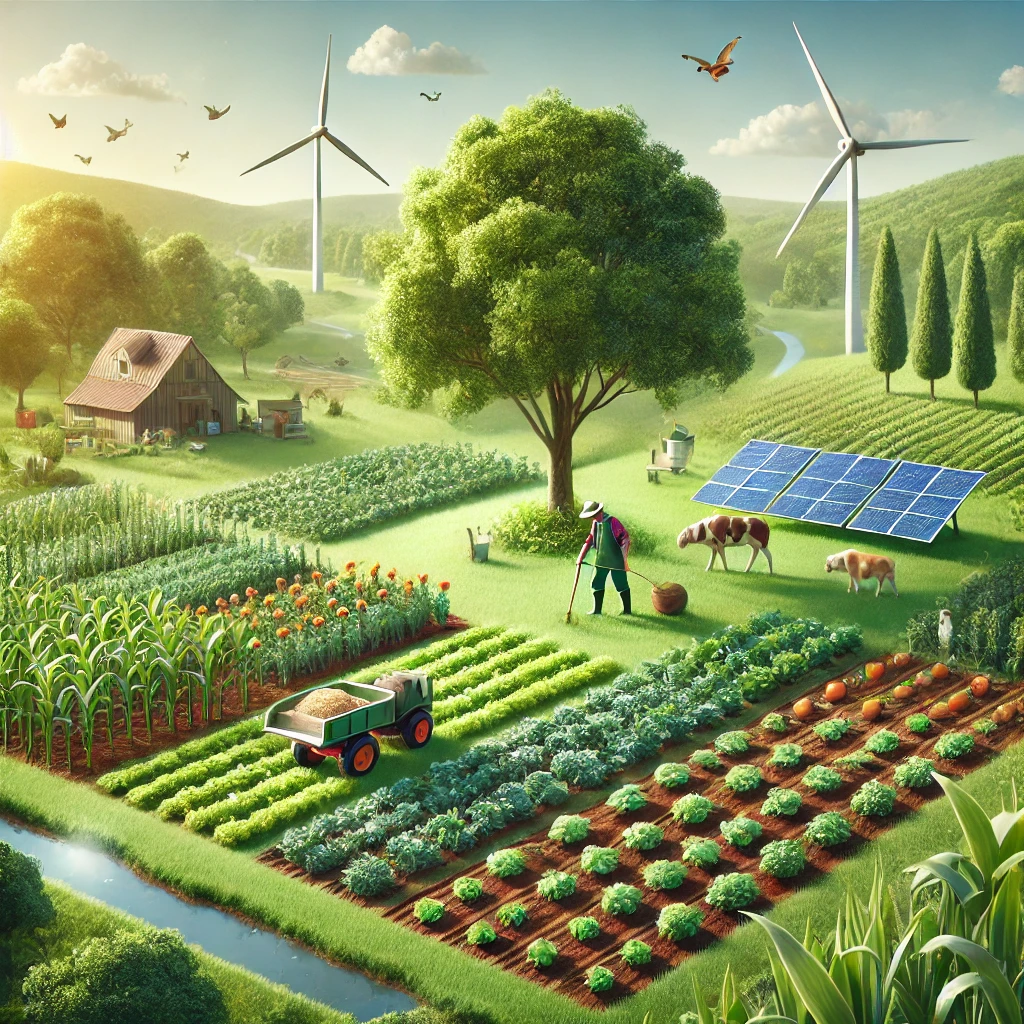
As the global population continues to rise, the demand for food is growing at an unprecedented rate. This increasing demand puts immense pressure on agricultural systems, threatening food security and exacerbating environmental challenges. Sustainable agriculture has emerged as a critical solution to these interconnected issues. By balancing productivity with environmental stewardship, sustainable farming practices aim to protect natural resources, mitigate climate change, and ensure that future generations have access to sufficient, nutritious food.
In this article, we will explore the impact of sustainable agriculture on global food security and its role in preserving the environment.
The Importance of Sustainable Agriculture
Sustainable agriculture focuses on methods that minimize environmental degradation, conserve resources, and enhance biodiversity while still producing enough food to feed a growing population. It moves away from industrial farming practices that rely on chemical inputs, monocultures, and intensive resource use, which have contributed to soil depletion, water scarcity, pollution, and greenhouse gas emissions.
The core principles of sustainable agriculture include:
- Efficient resource use: Using water, energy, and land in ways that preserve them for future generations.
- Soil health: Maintaining healthy, nutrient-rich soil to support plant growth and resilience.
- Biodiversity: Encouraging a variety of crops and farming techniques to foster ecosystem balance.
- Reduced chemical inputs: Minimizing or eliminating the use of synthetic pesticides and fertilizers that can harm the environment and human health.
How Sustainable Agriculture Impacts Global Food Security
1. Increases Long-Term Productivity
One of the misconceptions about sustainable agriculture is that it cannot meet the world’s food demands. However, sustainable practices like crop rotation, agroforestry, and organic farming often lead to higher long-term yields by improving soil health and reducing the need for costly inputs like fertilizers and pesticides. Healthy soil retains more nutrients and water, allowing for more consistent crop production, especially in regions vulnerable to drought or other climate extremes.
2. Reduces Vulnerability to Climate Change
Climate change poses significant threats to global food security, particularly in regions already experiencing food scarcity. Droughts, floods, and shifting weather patterns can devastate crops, reduce yields, and disrupt food supply chains. Sustainable agriculture practices help mitigate these risks by promoting resilient farming systems. Techniques such as no-till farming, agroforestry, and cover cropping protect soil and conserve water, helping farms adapt to changing environmental conditions.
3. Supports Local Economies and Food Systems
Sustainable agriculture often supports smallholder and family farms, which are essential for local economies and food systems, particularly in developing countries. By focusing on local food production and reducing dependency on imported, industrial-scale agriculture, these practices strengthen communities and contribute to food sovereignty. Sustainable methods also promote diversified crops, which increases food variety and resilience in the face of market fluctuations or supply chain disruptions.
4. Reduces Post-Harvest Losses
Another key aspect of food security is reducing food loss and waste. Traditional agricultural practices often lead to significant post-harvest losses due to poor storage, transportation, or preservation techniques. Sustainable agriculture focuses on improving post-harvest management through techniques like better storage systems, solar drying, and local food processing. These improvements help ensure that more food reaches the table, reducing waste and improving food access in underserved regions.
The Environmental Impact of Sustainable Agriculture
1. Conserves Water and Reduces Pollution
Industrial farming is notorious for its overuse of water and reliance on chemical fertilizers and pesticides, which contaminate water sources and degrade ecosystems. Sustainable agriculture promotes water conservation through methods like drip irrigation, rainwater harvesting, and cover cropping. These techniques not only reduce water usage but also prevent runoff that can carry harmful chemicals into rivers, lakes, and oceans.
2. Protects and Enhances Soil Health
Soil is a critical component of agriculture, and its degradation can severely impact food production. Industrial farming practices, such as monocropping and over-reliance on synthetic fertilizers, have led to widespread soil erosion, depletion of nutrients, and loss of organic matter. Sustainable agriculture emphasizes soil health by using techniques like crop rotation, composting, and reduced tillage. These practices improve soil fertility, prevent erosion, and enhance the soil’s ability to retain moisture, which is vital for crop growth.
3. Promotes Biodiversity
Industrial agriculture tends to favor monocultures—large-scale planting of a single crop. This not only depletes soil nutrients but also reduces biodiversity, making ecosystems more vulnerable to pests and diseases. Sustainable agriculture encourages crop diversity, agroforestry, and polycultures (growing multiple crops together), which enhance ecosystem health and resilience. Biodiverse farms support a wider variety of pollinators, predators, and other beneficial organisms, reducing the need for chemical pesticides and creating a more balanced ecosystem.
4. Reduces Greenhouse Gas Emissions
Agriculture is a major contributor to global greenhouse gas emissions, particularly through the use of synthetic fertilizers, deforestation for cropland, and methane emissions from livestock. Sustainable farming practices help reduce these emissions in several ways. Organic farming avoids synthetic fertilizers, agroforestry captures carbon in trees and soils, and regenerative agriculture techniques focus on sequestering carbon in the soil. These approaches not only lower emissions but also contribute to climate change mitigation by storing carbon.
Challenges and Opportunities in Scaling Sustainable Agriculture
Despite its clear benefits, sustainable agriculture faces challenges in scaling up to meet global food demands. Some of the obstacles include:
- Initial costs: Transitioning to sustainable practices can require significant upfront investments in new technologies, equipment, and training.
- Knowledge gaps: Farmers in many regions may lack the knowledge or resources to adopt sustainable methods, particularly in low-income or rural areas.
- Policy and market barriers: Many agricultural policies and subsidies still favor industrial farming practices, making it difficult for small-scale or sustainable farms to compete.
However, there are also numerous opportunities to expand sustainable agriculture:
- Government incentives: Governments can play a key role by providing subsidies, tax breaks, or grants to farmers who adopt sustainable practices.
- Consumer demand: As awareness of sustainability and environmental health grows, consumer demand for organic and sustainably produced food is increasing, driving market opportunities for farmers.
- Technological innovation: New technologies, such as precision farming, digital soil monitoring, and alternative protein sources, offer promising solutions for making agriculture more sustainable and efficient.
Sustainable agriculture is not just a niche movement; it is an essential approach to addressing the global challenges of food security and environmental degradation. By focusing on resource conservation, soil health, biodiversity, and climate resilience, sustainable farming practices have the potential to produce sufficient food for a growing population while preserving the planet’s ecosystems. To achieve widespread adoption, it will require collective action from governments, farmers, businesses, and consumers alike, working together to create a more sustainable and equitable food system for the future.

